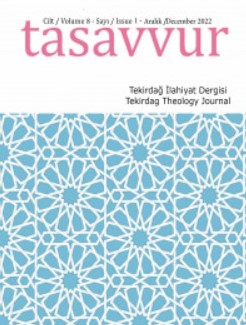Irak ve Semerkant Hanefîliğininin Nesih Anlayışı (Serahsî’nin Usûl’ü ile Alâuddîn es-Semerkandî’nin Mîzân’ı Çerçevesinde)
Naskh Understanding of Iraq and Samarkand Hanafism (Within the Frame of Sarakhsi’s Usûl and Alauddin es-Samarkandi's Mizan)
Author(s): Abdulmuid AykulSubject(s): Islam studies, Methodology and research technology, 6th to 12th Centuries, Qur’anic studies
Published by: Tekirdağ Namık Kemal Üniversitesi İlahiyat Fakültesi
Keywords: Fiqh; Fiqh Method; Naskh [Abrogation]; Sarakhsī; Samarkandī;
Summary/Abstract: In the Hanafī school, the writing of the fiqh method is basically divided into two sub-schools, namely the Iraqī and Samarkand method. Alaeddin es-Samarkandī (d.739/1144), one of the important representatives of the Samarkand school, who wanted the fiqh method to be rewritten from a theological perspective, strongly criticizes the method of writing, which became widespread in the Hanafī community before him. While he criticizes the methodists such as Dabusī (d.430/1039), who continued the Iraqī Hanafī methodists’ line, he never mentions Sarakhsī (d.483/1090) and Pazdawī (d.482/1089) in his work. However, when we look at the subject of naskh [abrogation], which we base our study on, it will be seen that the systematic of Samarkandī’s work called “al-Mīzān” is almost the same as the way it is handled in Sarakhsī's work of usûl. The main reason for comparing the understandings of abrogation of both scholars is the close relationship between the subject of abrogation and kalam. In this study, the focus will be on how both scholars approached abrogation and on their approaches to abrogation, and the similarities and differences between them will be pointed out. Whether this similarity and differences coincide with Samarkandī’s critique of the Iraqī sheikh; in other words, the extent to which Samarkandi was right in his criticism that the Hanafī companions before him did not include theological issues in their procedural works will be evaluated through Sarakhsī's understanding of abrogation.
Journal: Tasavvur Tekirdağ İlahiyat Dergisi
- Issue Year: 8/2022
- Issue No: 1
- Page Range: 251-287
- Page Count: 37
- Language: Turkish

